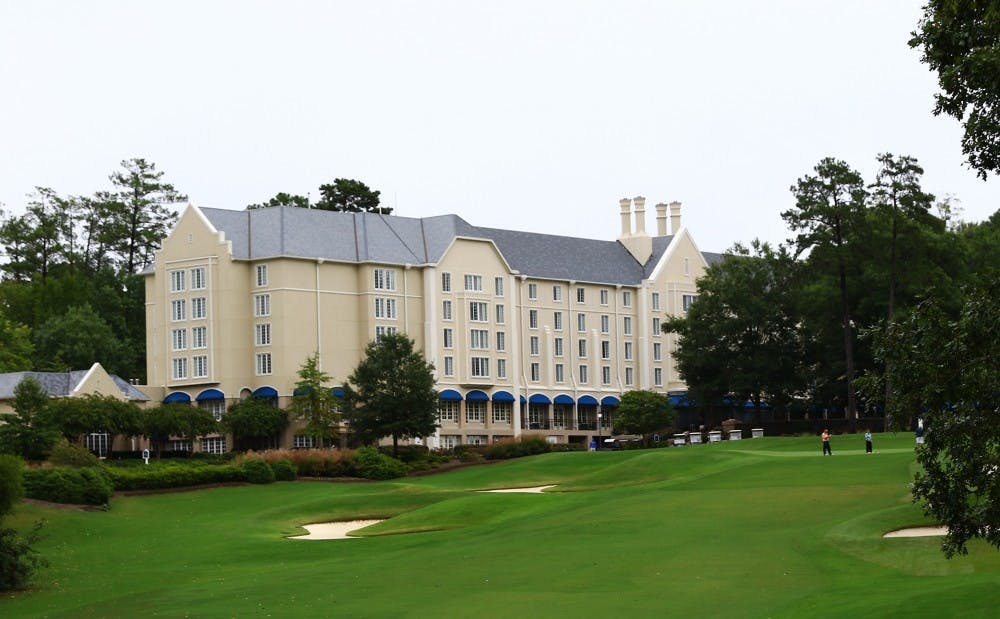Duke's 2016-17 tuition will increase 3.8 percent to $49,575.
The University's Board of Trustees approved the increase Saturday at the Washington Duke Inn and Golf Club, bringing the total cost of attendance in 2016-17 to $65,703. An identical 3.8 percent increase was approved last year.
President Richard Brodhead also led an extensive discussion about affordability in higher education. Duke is expected to spend $136.3 million of institutional funds on undergraduate financial aid during the current academic year, which concludes June 30, a $36.5 million increase since the 2009-10 academic year. Approximately half of the student body receives financial assistance from the University, with more than 40 percent receiving need-based financial aid.
"We’re always trying to strike a balance between affordability and the rich experience that people want when they come to a school like this, and that takes investment,” Brodhead said after the meeting.“Our policy has always been to mitigate the cost increases with increases in financial aid. The increase in our financial aid budget is always significantly higher than our increase in the tuition.”
Brodhead announced the creation of the new Washington Duke Scholars program for first-generation students last November.
The 2016-17 tuition rates for the graduate and professional schools can be viewed below.
In other business:
Provost Sally Kornbluth and Dr. A. Eugene Washington, chancellor for health affairs and CEO of Duke University Health System, led a conversation about research opportunities. Both Kornbluth and Washington discussed the potential for increased collaboration between Duke's main and medical campuses in conversations with The Chronicle last August.
Paul Modrich, James B. Duke professor of biochemistry, member of the Duke Cancer Institute and Howard Hughes Medical Institute investigator, met with the Trustees Saturday. Modrich was awarded the Nobel Prize in Chemistry last October with Aziz Sancar of the University of North Carolina at Chapel Hill and Tomas Lindahl of the Francis Crick Institute in the U.K. The trio made fundamental discoveries about DNA mismatch repair mechanisms—a critical process in maintaining the integrity of many organisms’ DNA.
Brodhead and David Rubenstein, Trinity '70 and chair of the Board of Trustees, explained that Modrich was very humble in his meeting with the Trustees, crediting those around him for the Nobel Prize victory.
"[He is] one of the more modest Nobel Prize winners I've ever met," Rubenstein said.
The co-chairs on the task force on bias and hate issues, Linda Burton, dean of social sciences and professor of sociology, and Kelly Brownell, dean of the Sanford School of Public Policy, presented to the Trustees. The task force began its work last month and is expected to complete its report in April.
"What we said at the end of last term was let's take the proper time to understand these things and figure out what the best actions are," Brodhead said. "That's not the same as saying let's take a lot of time to do nothing."
The Board approved the construction of a new $8 million softball facility adjacent to Jack Katz field hockey stadium at the corner of Broad St. and Markham Ave. Softball will become Duke's 27th varsity sport in the 2017-18 academic year, and the team's stadium is expected to be finished during Summer 2017. Construction is expected to begin in April.
Michael Schoenfeld, vice president for public affairs and government relations, noted that one benefit of the new stadium's location is that facilities such as training areas can be shared by the field hockey and softball teams. Brodhead added that the field will be used for recreational purposes.
Michael Merson, vice president and vice provost for global affairs, presented plans for future international engagement.
New 2016-17 tuition rates for Duke's graduate and professional schools can be viewed here:
- Divinity School: $22,360 (Master of Divinity), up 4 percent over the current year
- Fuqua School of Business: $63,200 (daytime MBA), up 4.3 percent
- Graduate School: $49,500 (Ph.D. programs), up 4 percent
- Law School: $58,700, up 3.9 percent
- Nicholas School of the Environment: $37,250, up 7.3 percent
- Pratt School of Engineering: $50,472 (Master of Engineering Management Program), up 4 percent
- Sanford School of Public Policy: $43,171 (Master of Public Policy), up 4 percent
- School of Medicine: $55,180, up 3 percent
- School of Nursing: $39,336, up 4.5 percent
Regarding the 7.3 percent increase in tuition for the Nicholas School of the Environment, Brodhead explained that he did not think the rise would be the beginning of a multi-year increase.
"It's just a re-normalization within the market," Brodhead said.
Duke football head coach David Cutcliffe and four Blue Devils—redshirt junior safety DeVon Edwards, redshirt junior defensive tackle A.J. Wolf, redshirt junior guard Tanner Stone and redshirt sophomore quarterback Parker Boehme spoke to the Trustees. The Trustees passed a resolution thanking the team for winning Duke's first bowl game in 54 years.
Get The Chronicle straight to your inbox
Signup for our weekly newsletter. Cancel at any time.

